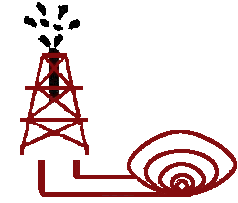 |
 |
| Home | Capabilities | Gallery | Discflo Pumps | H. Hot | Contact Us |
Other Industry Sectors: including mining, metal, environmental clean-up
Case Study: Environmental Clean-up
A landmark project for Discflo in Europe will be completed in 1998. The project, described as the most important environmental clean-up project ever undertaken and one of the most important contracts yet for Discflo, is costing Norwegian Krona 350 million in total. The project aims to establish treatment facilities for all types of hazardous waste - organic and inorganic - originating in Norway.
The first part of the project, the construction of a plant for handling inorganic waste on the Norwegian island of Langoya, was completed last year. This is where the first Discflo pumps were installed. They are pumping a wide variety of fluids, including acids, bases, hazardous waste for direct mix with gypsum, petroleum coke and contaminated earth.
These first pumps have proven very successful and have exceeded the customer's expectations. Based on this success, the project managers specified disc pump for the second part of the project, where Discflo's technology will feature even more prominently. This involves the building of a treatment facility in Brevik for disposing of organic waste. It will treat 30,000 tonnes a year and will be ready for start up at the end of this year. Disc pumps will be used in a number of applications, including tank loading, transfer, circulation and feeding. Again, a very wide variety of fluids will be pumped, with viscosities from 1 cP to 500 cP and specific gravities from 0.9 to 1.5. The maximum solids size is 60mm [2.5"] and most of the fluids are abrasive.
Discflo won the contract after fierce competition with several other pump manufacturers. The reasons that the customer gave for choosing the unique disc pump technology were as follows:
- The disc pump was the best solution technically because of its ability to pump difficult fluids and its operation is versatile enough to handle a range of fluid conditions without breaking down.
- The disc pump was the best solution economically, according to the Life Cycle Cost analysis carried out by the project contractors, ABB Offshore Technology.
- A number of disc pumps already installed at a cement plant in Brevik provided an excellent reference for the project. The cement plant pumps have been running 24 hours/day since start up in February 1997 without any problems.
The project managers considered and rejected centrifugal open impeller type, hose type and membrane type pumps because all fell short in terms of either Life Cycle Costs or technically.
Case Study: Abrasive Mill Spill
Pasminco, one of Australia's largest mining groups, has achieved a first with the disc pump. A specially designed disc pump at the Broken Hill mine in New South Wales is being used to pump a highly abrasive and dense mill concentrate. It has been operating continuously since January 1st, 1998, beating all previous pumps, none of which could last longer than four weeks in this application.
The pump is a combination of a 604 and a 403-2HHD, and has been rubber-lined for extra abrasive protection. The first prototype was designed and tested last years by George Fyfe of Transco, Discflo's distributor for Australia. The first production model was installed mid- December 1997 and has run continuously without any downtime since then, pumping 500 GPM at 35 ft TDH.
Mill spill concentrate is a remarkably difficult material to pump. It contains steel balls and ultra fine, highly abrasive particles, and is extremely dense, with a specific gravity of 2+. The mining company tried a number of different pumps before finding the disc pump, but all failed within four weeks or less due to abrasive wear.
Pasminco is happy with the disc pump's performance and plans to purchase an additional pump for Broken Hill and another for an application at a mill in Hobart, Tasmania. The pumps will be designed and installed by Transco Mfg Australia P/L.
Case Study: Plankton
Discflo donated two disc pumps to the Smithsonian Institution in Washington, US, for a highly unusual application - pumping living plankton. The pulsation-free, non-impingement action of the disc pump system ensures that no plankton is damaged in the pumping process.
The Smithsonian is happy with the quality and operation of the pumps, and has experienced no problems with their operation. Pump models 2015-2D and 312-2D are installed, using plastic Discpacs.
Case Study: Acid Slurry in Steel Mill
The Pennsylvannia plant of a major US steel manufacturer is using the Discflo disc pump technology for some extremely abrasive applications. One such application is pumping hydrofluoric/nitric acid solution at 1800 degF containing 1/2" ceramic brick particles. Some of the disc pumps are made of a non-metallic PVDF material, while the rest are our standard stainless steel construction.
The steel manufacturer originally employed end-suction centrifugal pumps in this application. However, these pumps suffered complete failure at least four times a year, each time costing $8000 to repair. The first disc pumps replaced them six years ago, and the Discflo equipment has performed exceptionally well ever since. "In six years, we have never had a pump failure," says Discflo's distributor in Pennsylvania. "Every time we've inspected the disc pumps, there has been no sign of appreciable wear on the Discpac".
Contact us for New Pump Sales, Parts & Repairs in Venezuela
Api 10 ingenieria, C.A.
Av. Venezuela Edif. Torre America piso 7, ofic. 703, Bello Monte Caracas
Phone: (0212) 762-8135 = (0212) 762-3271
api10ingenieria@api10.com



